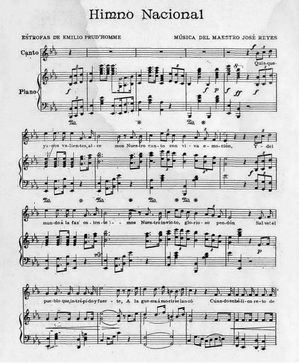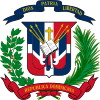National Anthem of the Dominican Republic
| English: National Anthem of the Dominican Republic | |
|---|---|
 | |
National anthem of the Dominican Republic | |
| Also known as | Quisqueyanos valientes (English: Valiant Quisqueyans) |
| Lyrics | Emilio Prud’Homme, 1882 |
| Music | José Rufino Reyes y Siancas, 1882 |
| Adopted | 30 May 1934 |
| Audio sample | |
U.S. Navy Band instrumental version (one verse) | |
The national anthem of the Dominican Republic (Spanish: Himno nacional de República Dominicana), also known by its incipit Valiant Quisqueyans (Spanish: Quisqueyanos valientes), was composed by José Rufino Reyes y Siancas (1835–1905), and its lyrics were authored by Emilio Prud'Homme (1856–1932).
History
José Reyes was inspired to create a national anthem for the Dominican Republic after having seen the Argentine National Anthem in the Parisian newspaper El Americano. In 1883, he invited his friend Emilio Prud'Homme to write lyrics for the anthem.[1]
The first version of Prud'Homme's lyrics was published in the weekly newspaper El Eco de la Opinion on 16 August 1883,[1] and the first public performance of the anthem took place the next day on 17 August[2] in Respectable Hope Lodge No. 9 in Santo Domingo.[3] Though the music was an instant success, several objections were made to the lyrics for having various historical inaccuracies. In 1897, Prud’Homme submitted revised lyrics, which stand to this day.[3]
On 7 June 1897, the Congress of the Dominican Republic passed an act adopting "Himno Nacional" with the original music and revised lyrics as the country's official national anthem; however, then-President Ulises Heureaux (1846–1898) vetoed the act, because the lyric's author, Prud’Homme, was an opponent of the president and his administration.[1] In 1899, Heureaux was assassinated, and the political disorder that ensued prevented the national anthem's legal adoption until 30 May 1934, when "Himno Nacional" was officially adopted and signed into law.[3][1][4]
Lyric
The Spanish name of the Dominican Republic, "República Dominicana", is never used in the anthem's official Spanish lyrics, nor is the demonym for Dominicans, "dominicanos". Rather, the indigenous word for the island of Hispaniola, "Quisqueya", is used twice, and its derivative demonym, "quisqueyanos", is used once. However, research later showed that these words do not seem to derive from the original Arawak Taíno language.[5]
In public, the national anthem is usually performed through the end of the lyric's fourth paragraph.
| Spanish original[3][6] | English translation |
|---|---|
I |
I |
Others
- ^ a b c d "Historia Dominicana". Portal Oficial de la República Dominicana (in Spanish). Retrieved 15 January 2022.
- ^ "Himno Nacional Dominicano". Educando, “El portal de la Educación Dominicana”. Archived from the original on 5 June 2019. Retrieved 15 January 2022.
- ^ a b c d "El himno nacional de la República Dominicana". Presidencia de la República Dominicana. Archived from the original on 6 July 2020. Retrieved 15 January 2022.
- ^ "José Reyes". Hoy Digital. 30 January 2005. Retrieved 15 January 2022.
- ^ Anglería, Pedro Mártir de (1949). Décadas del Nuevo Mundo, Tercera Década, Libro VII (in Spanish). Buenos Aires: Editorial Bajel.
- ^ "Himno Nacional". Ejército de República Dominicana. Archived from the original on 15 January 2022. Retrieved 15 January 2022.

